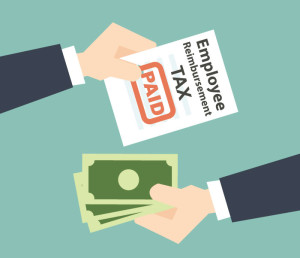 Reverse charge means the liability to pay tax is on the recipient of supply of goods or services instead of the supplier of such goods or services in respect of notified categories of supply. Two types of Reverse Charge scenarios has been categorized, i.e., dependent on the nature of supply and/or nature of supplier or where taxable supplies by any unregistered person to a registered person is covered. Further, a question of importance arises in everybody’s mind about the issue of taxability of employee reimbursements and applicability of reverse charge mechanism on the same.
Reverse charge means the liability to pay tax is on the recipient of supply of goods or services instead of the supplier of such goods or services in respect of notified categories of supply. Two types of Reverse Charge scenarios has been categorized, i.e., dependent on the nature of supply and/or nature of supplier or where taxable supplies by any unregistered person to a registered person is covered. Further, a question of importance arises in everybody’s mind about the issue of taxability of employee reimbursements and applicability of reverse charge mechanism on the same.
There can be the below scenarios on which conclusion is to be derived about the taxability of employee reimbursements and applicability of reverse charge mechanism:
- Reimbursement of expenses to employees for supplies received by employees from registered dealers :
As per the Section 7 of the CGST Act, any service provided by the employee to the employer in the course of or in relation to his employment shall neither be treated as a supply of goods nor supply of services. Therefore, reimbursements made to employee shall not be chargeable to GST.
Further, if the expenditure made by the employee on behalf of the employer is in the nature of business cost and incurred for the furtherance of business then the employer in such case can claim the Input Tax Credit (ITC) of such GST paid by the employee at the time of receipt of such supplies. It is to be noted that, the employer can only claim the ITC when the tax invoice issued by the supplier of goods / services to the employee has mention the Name and GSTIN of the employer as the recipient.
- Reimbursement of expenses for supplies received by employees from unregistered dealers:
Re-imbursements shall not be liable to GST as it is concluded from the above discussion that any service provided in the course of employment shall not be liable to GST irrespective of the nature of the re-imbursement i.e., personal or professional.
As per the concept of Reverse Charge Mechanism, where the supply has been made by unregistered dealer to the registered dealer, the onus of discharging the tax liability under RCM shall be on registered recipient. Therefore, in order to confirm the tax liability of GST, it is mandatory to determine the the recipient and the registration status of the recipient of the goods / services.
The actual recipient of the goods / services is determined as below :
“(93) “recipient” of supply of goods or services or both, means—
|
(a) |
|
where a consideration is payable for the supply of goods or services or both, the person who is liable to pay that consideration; |
|
(b) |
|
where no consideration is payable for the supply of goods, the person to whom the goods are delivered or made available, or to whom possession or use of the goods is given or made available; and |
|
(c) |
|
where no consideration is payable for the supply of a service, the person to whom the service is rendered, |
and any reference to a person to whom a supply is made shall be construed as a reference to the recipient of the supply and shall include an agent acting as such on behalf of the recipient in relation to the goods or services or both supplied;”
As per the above definition, it can be construed that employer can be considered as recipient as employee can always be said to be an ‘agent’ of his employer.
For determining the registration status of recipient (employer), relevance can be place on Section 25 of the CGST Act which is as below:
“(1) Every person who is liable to be registered under section 22 or section 24 shall apply for registration in every such State or Union territory in which he is so liable within thirty days from the date on which he becomes liable for registration, in such manner and subject to such conditions as may be prescribed”
Further, registration status needs to be checked state wise as a person registered in one State may not be registered in another State.
- Expenses for which employer is not under any obligation to reimburse:
As per the GST Act, “gifts not exceeding fifty thousand rupees in value in a financial year by an employer to an employee shall not be treated as supply of goods or services or both”. Therefore, it can be construed that any re-imbursement to the employee on special occasions shall be considered as Gift which should not be subject to GST if value is less than fifty thousand rupees (per employee) in a financial year.
To Conclude :
Input Tax Credit shall be available to the employer on the GST paid by the employee for the goods / services received by him on behalf of the employer subject to the condition that Tax invoice contains the name and GSTIN of the employer as the recipient. Further, the tax invoice can also be questioned by the auditors if the ITC is claimed by the employer on the invoices in the name of the employees. Hence, the Name and GSTIN of the employer has to be there in the tax invoice to claim the ITC on the same.

 Toll Free:
Toll Free:  Contact Us
Contact Us

